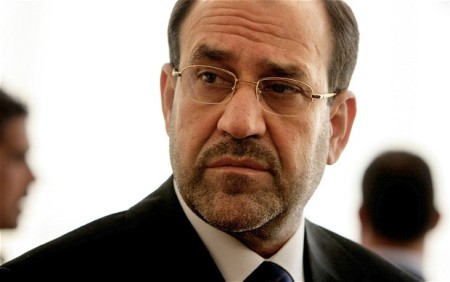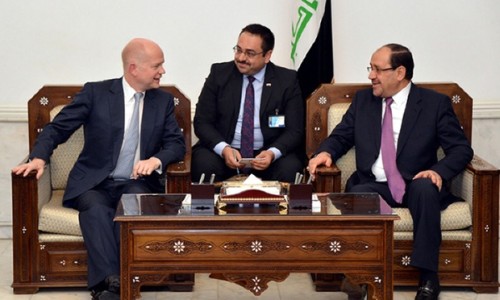LATEST: Video — Iraqi Military “Our Forces Still Control Baiji Oil Refinery”
UPDATE 1845 GMT: British Foreign Secretary William Hague has given a Twitter summary of his meetings in Baghdad today:
In my meetings with Iraqi leaders discussed the need to form an inclusive government, and break with sectarian politics of the past
— William Hague (@WilliamJHague) June 26, 2014
World needs to see Arab nations taking a visible lead in confronting the threat from ISIL. Solution has to be found in this region
— William Hague (@WilliamJHague) June 26, 2014
Events in #Iraq also part of new trend – terrorists seeking to take over territory/economic assets of wealthy states. Needs global response
— William Hague (@WilliamJHague) June 26, 2014
UPDATE 1600 GMT: British Foreign Secretary William Hague, pursuing a “unity” government, meets Prime Minister Maliki, who has rejected an emergency administration:
No details have been released of the discussion.
UPDATE 1445 GMT: Prime Minister al-Maliki has welcomed the Syrian airstrikes on Islamic State of Iraq and as-Sham positions near Al Qaim in northwest Iraq, while saying they were “on the Syrian side of the border”:
There was no coordination involved, but we welcome this action. We welcome any Syrian strike against Isis, because this group targets both Iraq and Syria….They carry out their strikes and we carry out ours. The final winners are our two countries.
Prime Minister Nuri al-Maliki, defying pressure inside and outside Iraq, has rejected the maneuvers for a new Government.
US Secretary of State John Kerry spoke to leading Iraqi politicians on Monday and Tuesday about a “salvation” Administration, but Maliki was defiant yesterday: “The call to form a national emergency government is a coup against the constitution and the political process.”
Kerry tried to play down the Prime Minister’s dismissal, saying that the new Government was “not something that was on the table”; however, the developments left no apparent political option as insurgents continued to press their offensive.
Maliki said he would begin a process on July 1 to seek a new Parliament; however, he offered no insight as to how he would establish a governing coalition.
Elections on April 30 gave the Prime Minister’s bloc the largest share of seats, but left it far short of a majority and Maliki had been unable to convince other Shia and Kurdish parties to back his renewed Administration.
On the military front, insurgents took three small oilfields east of Tikrit, while Iraqi forces continued to try and prevent the loss of the Baiji oil refinery — one of three in Iraq — between Mosul and Baghdad.
About 90 km (56 miles) north of Baghdad, the insurgency also surrounded one of Iraq’s largest bases, known as “Camp Anaconda” during the US occupation.
Video: Iraqi Military — Our Forces Still Control Baiji Oil Refinery
The Iraqi military continues to insist that it controls Baiji oil refinery, more than a week after insurgents moved into the complex, 130 miles north of Baghdad.
An officer on the broadcast said, “All the refinery is under our control, ISIS (Islamic State of Iraq and as-Sham) could not get anything. The battle has continued for seven days. More than 90 ISIS militants have been killed. The local Baiji tribes are working with us.”
(h/t Mona Mahmood of The Guardian)
Kurdish Forces and Insurgents Clash in Northern Nineveh Province
Kurdish peshmerga forces and insurgents have fought in Hamdaniya in northern Nineveh province.
The Kurdish outlet Rudaw said peshmerga were attacked as they tried to dig defensive trenches to protect Christians and Shabak Kurds. Three soldier were wounded, and there were casualties among insurgents.
Thousands of civilians fleeing the initial wave of fighting two weeks ago in northern Iraq had moved into the area, seeking Kurdish protection.
Insurgents Take Town and Four Gas Fields An Hour from Baghdad
Insurgents have captured Mansouriyat al-Jabal, which has four gas fields where foreign companies operate, according to security forces.
Syrian Regime: We Didn’t Carry Out Deadly Airstrike Inside Iraq — Maliki: Yes, You Did
State news agency SANA has rejected reports that Syrian warplanes attacked the border town of al-Qaim inside Iraq on Tuesday, killing at least 57 and injuring 132.
See Syria Daily, June 25: Did Regime Warplanes Strike Inside Iraq?
A “media source” dismissed “several news reports by media outlets who continue to cover up for terrorist groups”.
However, Prime Minister Nuri al-Maliki echoed the claims of senior US and Iraqi military officials that Damascus was responsible.
Insurgents seized Al Qaim and the nearby border crossing last week.
Aftermath of the airstrikes:
Iraqi Official: Half of Army Destroyed & $10 Billion Lost in 2 Weeks
The Kurdish outlet Rudaw, citing “a senior Iraqi defense official”, says the Iraqi army has lost 7 divisions in the past two weeks of the insurgent offensive.
The official said, “The damage to the Iraqi army is estimated to be more than $10 billion, not taking into account the hundreds of army officers lost. So far, seven military divisions have been destroyed.”
Sunni Leader in Western Iraq: “We Expect US to Stop Working With Iran and Maliki”
Saad Abu Risha, head of a Sunni council in Anbar Province, has been prominent as insurgents have taken control of part of the area in western Iraq.
Risha, a former member of a coalition Government led by Prime Minister Nuri al-Maliki, explains what he now expects of the US and the West:
We expect them to stop collaborating with Iran and to prevent Iran from interfering in Iraqi affairs. We ask them not to help Maliki with his sectarian agenda, and not to support the entrenchment of Shiite sectarianism. We want them to support the rebellious tribes against Maliki’s injustice. We want them to help the tribes expel Iranian ISIS (Islamic State of Iraq and as-Sham) from Iraq.
The American government is avoiding us. They only listen to one side, Maliki.
Abu Risha grounds the insurgency in local demands of Baghdad, saying his council was formed in December amid demonstrations at a deadly crackdown on protest camps:
For an entire year Sunnis have been demanding their rights peacefully. The Maliki government responded to our demands with mockery and derision. Maliki used sectarian militias and attacked unarmed protestors in Faluja, Diyala and Hawija provinces. He ignited the rage of the Sunni street.
Six Civilians Killed by Iraqi Helicopter in Anbar Province
An Iraqi military helicopter killed six people, including two children and a doctor, in Ana in Anbar province on Wednesday, according to police and health officials.
The helicopter fired two rockets, with one hitting a mosque and the other striking a nearby house.
At least 21 people, most of them children between the ages of 6 and 12, were wounded in the airstrike.
The children were in a Qur’an study session at the mosque.
Ana is one of a series of towns taken by insurgents between the Syrian border and Baghdad last week.
Suicide Bombs Kill 6 in Kirkuk, 12 South of Baghdad
A car bomb at an outdoor market in northern Kirkuk on Wednesday killed at least six people and wounding 21, police officials said.
In Mahmoudiya, about 35 km (22 miles) south of Baghdad, a suicide bomber and a mortar attack on a coffee shop and other buildings killed 12 people and injured 46.
US Advisors Begin Work in Baghdad
Iraq’s military spokesman, General Qassim Atta, said US military advisors have begun working in the Defense Ministry, the Interior Ministry, the Baghdad Operations Center, and the counterterrorism unit.
About 90 of 300 special forces and advisors promised by President Obama have arrived in Baghdad, with 40 working at the US Embassy reassigned to work with the Iraqis.
Atta reassured that security forces control the road from Baghdad to Samarra, 70 miles to the north.
Samarra is home to two Shia shrines and has been the frontline of the fight since insurgents moved south from Mosul and Tikrit two weeks ago.


